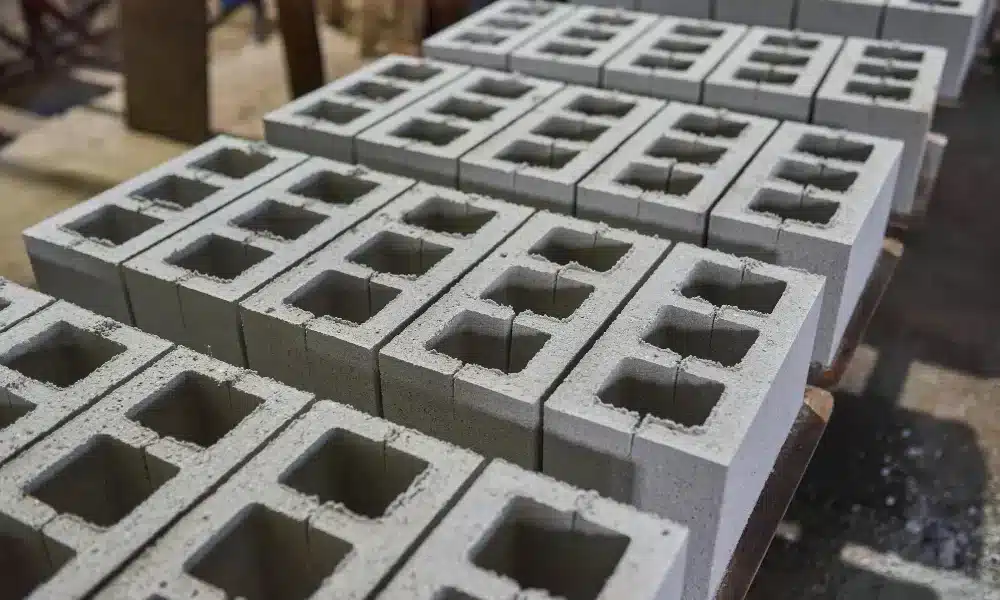Business
Current Prices Of 6-Inch and 9-Inch Blocks In Nigeria
By Benjamin Abioye

In Nigeria, the cost of building blocks varies significantly based on size, type, and location. Generally, 9-inch blocks are more expensive than 6-inch blocks. The prices also fluctuate across different regions such as Lagos, Abuja, Ogun, Port Harcourt, and Ibadan, with Lagos often having the highest prices.
Building blocks, the modular units used in construction, are made from materials like concrete, cement, clay, or other composites. They come in various types, each suited for different construction needs:
-Hollow Blocks: These blocks are lighter and offer better insulation properties. They are often used in constructions where weight is a consideration and where some level of insulation is required.
- Solid Blocks: These blocks are known for their strength and durability. They are typically used in structures that require more load-bearing capacity.
- 6-Inch Blocks: These come in both hollow and solid forms, used for general construction purposes.
- 9-Inch Blocks: Also available in hollow and solid forms, these are used for more robust constructions requiring additional strength and insulation.

Building blocks are fundamental to the construction industry in Nigeria. Their popularity stems from their affordability, availability, and suitability for the local climate. Made from materials like concrete, sand, and cement, these blocks can endure Nigeria’s harsh weather conditions, including heavy rains and intense heat.
Thermal Efficiency: Building blocks contribute to the thermal efficiency of buildings. They provide excellent insulation, helping to keep interiors cool during the day and warm at night, leading to significant energy savings.
Economic Impact: The local production of building blocks boosts the Nigerian economy by providing employment opportunities and contributing to the GDP. Since they are produced locally, they are readily available, reducing the time and cost associated with importing construction materials.
Current Prices of Building Blocks in Nigeria
The cost of building blocks in Nigeria is influenced by several factors, including the type and size of the block, location, and the prices of cement and sand. Here’s a detailed look at the prices:
- 6-Inch Hollow Blocks: Typically cost between NGN 400 to NGN 500 per block. These are used for general wall constructions.
- 6-Inch Solid Blocks: Range from NGN 600 to NGN 700 per block. They are used where additional strength is needed.
- 9-Inch Hollow Blocks: Usually priced around NGN 650 per block, used for external walls and partitions requiring more insulation.
- 9-Inch Solid Blocks: Priced at approximately NGN 750 per block, used for more demanding structural needs.
- 5-Inch Blocks: These are generally cheaper, around NGN 350 per block, and are used for non-load-bearing walls and partitions.

Specific Block Prices Based on Location
Lagos: Prices are generally higher in Lagos due to the high demand and increased operational costs. For instance, 9-inch blocks can cost between NGN 700 to NGN 800.
Abuja: Similar to Lagos, the cost of blocks in Abuja is on the higher side. The prices of 6-inch blocks range from NGN 450 to NGN 550.
Ogun State: Blocks are slightly cheaper here compared to Lagos. The price of a 9-inch block is typically around NGN 600.
Port Harcourt: Prices are comparable to Abuja and Lagos due to the high demand in this oil-rich region. A 6-inch block can cost around NGN 500.
Ibadan: Being relatively affordable, the cost of blocks in Ibadan can range from NGN 400 to NGN 500 for 6-inch blocks.
Factors Influencing Block Prices
Several factors contribute to the varying prices of building blocks across Nigeria:
- Cement Prices: Fluctuations in cement prices directly affect the cost of blocks.
- Sand Prices: The availability and cost of sand also play a significant role.
- Labor Costs: Regions with higher labor costs will see higher block prices.
- Transportation Costs: The cost of transporting materials to different locations affects the final price of the blocks.
- Demand and Supply: Areas with high construction activity have higher prices due to increased demand.
Conclusion
Building blocks are a cornerstone of the Nigerian construction industry, favored for their durability, strength, and cost-effectiveness. The prices of these blocks vary based on type, size, and location, influenced by factors such as material costs and local economic conditions. Despite the price fluctuations, building blocks remain a popular choice due to their ability to withstand Nigeria’s climatic conditions and their contribution to the local economy.
Send Us A Press Statement Advertise With Us Contact
And For More Nigerian News Visit GWG.NG

